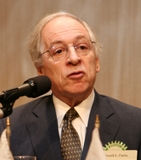��The 2008 Presidential Election and Future of US��Japan Relations��
May 28, 2008
Mr. Gerald L. Curtis,
Burgess Professor of Political Science,
Columbia University
 ��Whether an African American or a woman wins the Democratic nomination for the 2008 presidential election, it will be a first since the founding of the United States. The coming election is unmistakably among those that have drawn the most interest in U.S. election history.
��Whether an African American or a woman wins the Democratic nomination for the 2008 presidential election, it will be a first since the founding of the United States. The coming election is unmistakably among those that have drawn the most interest in U.S. election history.
��Barak Obama��s father is a Kenyan and his mother is white. He grew up in Hawaii and spent his elementary school years in Jakarta, Indonesia. Obama seems to epitomize the multiracial nature of United States. Even those who have no interest in politics had the television turned on the entire time as they listened to the debate between Obama and Hillary Clinton. In particular, interest in the election is increasing among young people.
��In these primaries, an interesting phenomenon occurred. There were no voices criticizing the primary system as too long, too costly or complicated. Not only that, but there were an increasing number of voices endorsing it as a good system.
��One of the reasons that a long primary period is good is that if the primary election had been held in January��February, Hillary would have won. However, by prolonging the election Obama��s strengths, wisdom and character are beginning to show. In the opinion of today��s Americans this is a good thing.
��One more interesting phenomenon is the changes in the Caucuses. In the Caucuses, a meeting is held and all of the participants announce the candidates they support and the results are entrusted with the delegates. In the past there was criticism of the Caucuses, but now they are favored. The method of holding Caucuses has also changed to one in which the candidates now meet each other face to face in someone��s living room. The topic of conversation spreads through the neighborhood and the newspapers pick up the scene. Obama was also strong in the Caucuses. In the United States, a new political jargon was born.
��Primaries are wholesale politics and Caucuses are retail politics��.
��Use of the Internet has also changed elections. Obama collected \5.5 billion just in the month of February over the Internet. 730,000 people made contributions. 90% of those made contributions of $100 or less and 50% made contributions of $25 or less.
��Up to now, Obama has collected contributions from 1.5 million people; Hillary, only half that number. Therefore, together over 2 million Americans made contributions to the Democratic candidates.
��In the beginning of this year, it was said that elections cost too much money, but now even ordinary citizens can participate in politics. Even a small contribution can signal one��s commitment to a politician. A strong sense of support has been born among ordinary people. In this way, the change in Americans�� feelings is extremely significant.
��In August conventions concluded for both the Democrats and Republicans, and it is now a battle between Obama and John McCain, difficult to predict the victor.
��Obama is young, and he has charisma, which provides new hope. His appeal is the Change he promotes.
��McCain also has positive attributes, and because he is older than Obama he has rich political experience. He is particularly strong in the areas of foreign diplomacy and defense. In the United States the fear of terrorism is strong, and McCain��s proposed measures against terrorism are his strength.
��For Japan, it is in the national interest to have a good relationship with the United States, and on this point Obama and McCain agree. Therefore, no matter who wins, there will be no change in that aspect of Japan��s national interest.
��One area of concern is the elections of the United States Senate and House of Representatives. The coming elections will likely result in major victories for the Democrats. If that occurs, it will probably result in increasing pressure from Congress calling for protectionism. This will be a major issue not only for Japan but for the whole world.
��How Japan progresses from here on out will not be about how to respond to U.S demands, but instead Japan will have to think about what proposals it can make to the U.S. In order to strengthen US – Japan relations, and improve the relationships among Japan, the United States and China. Japan needs to practice not reactive diplomacy but active proposal diplomacy.